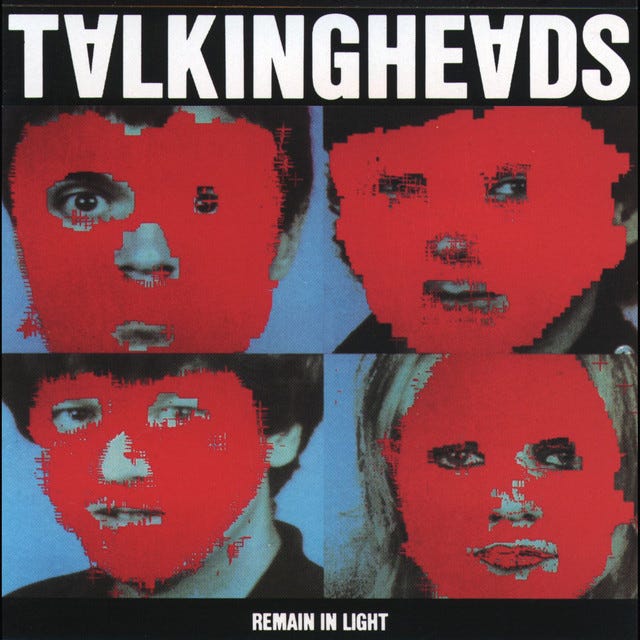Genre of the Day - Post-Punk
Album of the Day - In Light by Talking Heads (1980)
Back to regularly scheduled programming! I’m thankful for the break yesterday brought. Today’s article feels like returning to the office with a stack of papers on the desk, given that today’s album is only one of the most acclaimed of all time and today’s genre also represents the lodestone of alternative music’s last four decades, really. Today, I went to a Ravyn Lenae concert, who released one of the best albums of this year and whose artistic story I’ve loved following since discovering her in high school. Not only was she an incredible performer, moving around with miraculous fluidity in a high-fashion leather skirt, she was adept at connecting with the audience with comforting little speeches reaffirming Birds Eyes’ themes of connecting with oneself and healing. The elegantly simple line “It don’t gotta mean that much” in “Pilot” has been resonating; it don’t gotta mean that much. Rome wasn’t built in a day, and nobody expects me to exceed any of the millions of Talking Heads reviews.
Post-punk is a funnily apt resumption to the themes of chronology and the long arc of human musical history, with my own growing-older birthday post slotted in between; my last real article took us back to the Stone Age and music’s precocious beginnings as an expression of human’s social connection. This may be the most insufferable sentence I ever penned on digital paper, and I’ve written so many, but I’ve been really interested in the concept of postmodernism lately. Its theories that try to intellectually detangle the complex mess of our hyperreality and its rampant problems are fascinating. Can music do all that? Unfortunately, the word epistemological doesn’t vocally roll off the tongue. But post-punk is its best musical analogue to its tenets, of upending accepted realities and pushing forth the limits of music in a deculturated world.
Post-punk declared in the late ‘70s that punk’s individual, DIY modicum of expression should invigorate and widen its sonic purview rather than limit it to the harder-edged rock that characterized early punk. Experimentation and collaging ran amok in post-punk’s frenzied world, from dub’s ventures in mixing to funk, electronica, and styles plucked from around the globe as the marketing of “world music” began to flourish in the late ‘70s. To mainstream punk, this pretentious artsiness was not attuned to its original tenets; for post-punk bands, they were simply one step ahead, shaking off any and all normative discourses of what defines punk, rock, and art.
Talking Heads’ 1980 In Light is a surrealist and extremely up-the-EGP-alley articulation of these mentalities. The New York quartet mix guitars that leap and skitter with boundless sound hodgepodging by way of freaked-out funk and West African Afrobeat, itself a fusion genre of highlife and jazz. The half-anxiety, half-danceability that grabs you on “Crosseyed and Painless,” probes the idea of subjective truth: “Facts all come with points of view / Facts don't do what I want them to.” Byrnes’ television-preacher intensity presides over these thrilling sonic circuses as in the cultic rumba, electronica extravaganza of “The Great Curve” or the unfolding drama of American interventionism on “Listening Wind,” which foresees the international political upheavals of the 2000s years ahead. “Once In A Lifetime” is a song that has grabbed me since my childhood, its chorus evoking the euphoria and mania of life’s cyclical nature. There may be no objective reality, but per my opinion, it’s an earth-shaking synthesis of exploration in music and meaning.





this is the album, or maybe the band, where my understanding of post-punk vs. new wave fizzles a little bit. I have a set list of bands in each genre that I'm fairly confident of, and a relatively good grasp of the history compared to the average schmoe, but the infighting around it all just gives me a headache. I do know how much I love post-punk though. what a hell of a genre.
One of the greatest albums ever, for sure. I always just thought of it as somewhere between punk and new wave--and maybe that's what the phrase "pretentious artsiness" is getting at. But maybe giving it it's own genre is slicing things too thin?